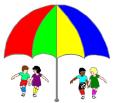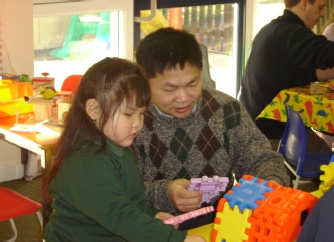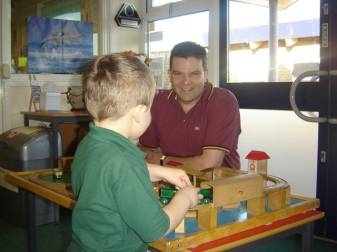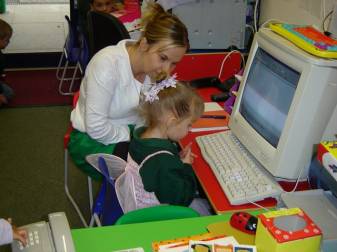

Welcome To
Holy Cross Pre-
‘Working closely with local families & schools to provide & promote quality Childcare’
Prospectus
4.5 Early years prospectus
Our setting aims to:
§ provide high quality care and education for children below statutory school age;
§ work in partnership with parents to help children to learn and develop;
§ add to the life and well-
§ offer children and their parents a service that promotes equality and values diversity.
Parents
Parents are regarded as members of our setting who have full participatory rights. These include a right to be:
§ valued and respected;
§ kept informed;
§ consulted;
§ involved; and
§ included.
Our setting depends on the good will of parents and their involvement to keep going. Membership of the setting carries expectations on parents for their support and commitment.
We aim to ensure that each child:
§ is in a safe and stimulating environment;
§ is given generous care and attention, because of our ratio of qualified staff to children, as well as volunteer & parent helpers;
§ has the chance to join with other children and adults to live, play, work and learn together;
§ is helped to take forward her/his learning and development by being helped to build on what she/he already knows and can do;
§ has a personal key person who makes sure each child makes satisfying progress;
§ is in a setting that sees parents as partners in helping each child to learn and develop; and
§ is in a setting in which parents help to shape the service it offers.
Children's development and learning
From September 2008 the Early Years Foundation Stage became law.This brings together Birth to Three Matters and the Curriculum Guidance for the Foundation Stage. Our provision reflects the four key themes and 16 commitments of the Early Years Foundation Stage, which is now guided by the new Statutory framework for early years foundation stage from September 2014 ( Click Here )
A Unique Child
Child Development: Skilful communicator,competent learner.
Inclusive Practice: Equality and diversity, children’s entitlements, early support.
Keeping Safe: Being safe and protected, discovering boundaries, making choices.
Health and Well-
Positive Relationships
Respecting Each Other: Understanding feelings, friendship, professional relationships.
Parents as Partners: Respecting diversity, communication, learning together.
Supporting Learning: Positive interactions, listening to children, effective teaching.
Key Person: Secure attachment, shared care, independence.
Enabling Environments
Observation, Assessment and Planning: Starting with the child, planning, assessment.
Supporting Every Child: Children’s needs, the learning journey, working together.
The Learning Environment: The emotional environment, the outdoor environment, the indoor environment.
The Wider Context: Transitions and continuity, multi-
Learning and Development
Play and Exploration: Learning through experience, adult involvement, contexts for learning.
Active Learning: Mental and physical involvement, decision making, personalised learning.
Creativity and Physical Thinking: Making connections, transforming and understanding, sustained shared thinking.
Areas of Development and Learning.
How we provide for development and learning
Children start to learn about the world around them from the moment they are born. The care and education offered by our setting helps children to continue to do this by providing all of the children with interesting activities that are appropriate for their age and stage of development.
The Areas of Development and Learning comprise:
§ personal, social and emotional development;
§ communication, language and literacy development;
§ Mathematics;
§ Understanding of the world;
§ physical development; and
§ creative development.

|
Mornings |
|
Afternoons |
|
08:30 |
Staff setting up room with equipment, toys, and activities + staff meeting |
12:00 |
|
08:50 |
Arrival. Available Key workers meet and greet children. Parents help children to independently post own name, place home bags into girl/boy crates & hang coats up. Topic items given to staff on Tuesday + Wednesday for show & tell. Children settle for a story or rhymes as parents/carers leave. |
12:10 |
|
08:55 |
Registration. Children respond to their names being called. Children then enter into a short time of discussion/interaction & listening connected with the topic. Craft & activities will be explained. Dates, day of the week, Weather seasons updated from previous day |
12:15 |
|
09:15 |
Morning children – group craft related to the topic Afternoon children – lunch, fruit, milk/water |
12:30 |
|
09:30 |
Free play including outside play. staff will engage large & small groups of children into appropriate activities linked to the Early Learning Goals [EYFS] & our topic. Tidy Up Time - |
1:00 |
|
10:55 |
CARPET the children are asked to walk to the carpet area ready for story/ singing/exercise/music/instruments etc |
2:50 |
|
11:15 |
Morning Children wash hands in preparation for dinner |
|
|
11:50 |
Home time – Parents and carers arrive. Children are released into the care of their designated adult. (over 16yrs) |
3:10 |
For each area, the practice guidance sets out the Early Learning Goals. These goals state what it is expected that children will know and be able to do by the end of the reception year of their education.
The practice guidance also sets out in ‘Development Matters’ the likely stages of progress a child makes along their learning journey towards the early learning goals. Our setting has regard to these matters when we assess children and plan for their learning.
Personal, social and emotional development
Our programme supports children to develop:
§ positive approaches to learning and finding out about the world around them;
§ confidence in themselves and their ability to do things, and valuing their own achievements;
§ their ability to get on, work and make friendships with other people, both children and adults;
§ their awareness of, and being able to keep to, the rules which we all need to help us to look after ourselves, other people and our environment;
§ their ability to dress and undress themselves, and look after their personal hygiene needs; and
§ their ability to expect to have their ways of doing things respected and to respect other people's ways of doing things.
Communication, language and literacy
Our programme supports children to develop:
§ conversational skills with one other person, in small groups and in large groups to talk with and listen to others;
§ their vocabulary by learning the meaning of -
§ their ability to use words to describe their experiences;
§ their knowledge of the sounds and letters that make up the words we use;
§ their ability to listen to, and talk about, stories;
§ knowledge of how to handle books and that they can be a source of stories and information;
§ knowledge of the purposes for which we use writing; and
§ making their own attempts at writing.
Mathematics
Our programme supports children to develop:
§ understanding and ideas about how many, how much, how far and how big;
§ understanding and ideas about patterns, the shape of objects and parts of objects, and the amount of space taken up by objects;
§ understanding that numbers help us to answer questions about how many, how much, how far and how big;
§ understanding and ideas about how to use counting to find out how many; and
§ early ideas about the result of adding more or taking away from the amount we already have.
Understanding of the world
Our programme supports children to develop:
§ knowledge about the natural world and how it works;
§ knowledge about the made world and how it works;
§ their learning about how to choose, and use, the right tool for a task;
§ their learning about computers, how to use them and what they can help us to do;
§ their skills on how to put together ideas about past and present and the links between them;
§ their learning about their locality and its special features; and
§ their learning about their own and other cultures.
Physical development
Our programme supports children to develop:
§ increasing control over the large movements that they can make with their arms, legs and bodies, so that they can run, jump, hop, skip, roll, climb, balance and lift;
§ increasing control over the small movements they can make with their arms, wrists and hands, so that they can pick up and use objects, tools and materials; and
§ their understanding about the importance of, and how to look after, their bodies.
Creative development ( Expressive Arts and Design )
Our programme supports children to develop:
§ the use of paint, materials, music, dance, words, stories and role-
§ their interest in the way that paint, materials, music, dance, words, stories and role-
Our approach to learning and development and assessment
Learning through play
Play helps young children to learn and develop through doing and talking, which research has shown to be the means by which young children learn to think. Our setting uses the practice guidance Early Years Foundation Stage to plan and provide a range of play activities which help children to make progress in each of the areas of learning and development. In some of these activities children decide how they will use the activity and, in others, an adult takes the lead in helping the children to take part in the activity. In all activities information from the practice guidance to the Early Years Foundation Stage has been used to decide what equipment to provide and how to provide it.
Assessment
We assess how young children are learning and developing by observing them frequently. We use information that we gain from observations, as well as from photographs or videos of the children, to document their progress and where this may be leading them. We believe that parents know their children best and we ask them to contribute to assessment by sharing information about what their children like to do at home and how they as parents are supporting development.
We make periodic assessment summaries of children’s achievement based on our ongoing development records. These form part of children’s records of achievement. We undertake these assessment summaries at regular intervals as well as times of transition, such as when a child moves into a different group or when they go on to school.
Records of achievement
The setting keeps a record of achievement for each child. Staff and parents working together on their children's records of achievement is one of the ways in which the key person and parents work in partnership. Your child's record of achievement helps us to celebrate together her/his achievements and to work together to provide what your child needs for her/his well-
Your child's key person will work with you to keep this record. To do this you and she/he will collect information about your child's needs, activities, interests and achievements. This information will enable the key person to identify your child's stage of progress. You and the key person will then decide on how to help your child to move on to the next stage.
Working together for your children
n our setting we maintain the ratio of adults to children in the setting that is set through the Welfare Requirements. We also have volunteer parent helpers where possible to complement these ratios. This helps us to:
§ give time and attention to each child;
§ talk with the children about their interests and activities;
§ help children to experience and benefit from the activities we provide; and
§ allow the children to explore and be adventurous in safety.
How parents take part in the setting
Our setting recognises parents as the first and most important educators of their children. All of the staff see themselves as partners with parents in providing care and education for their child. There are many ways in which parents take part in making the setting a welcoming and stimulating place for children and parents, such as:
§ exchanging knowledge about their children's needs, activities, interests and progress with the staff;
§ helping at sessions of the setting;
§ sharing their own special interests with the children;
§ helping to provide, make and look after the equipment and materials used in the children's play activities;
§ taking part in events and informal discussions about the activities and curriculum provided by the setting;
§ joining in community activities in which the setting takes part; and
§ building friendships with other parents in the setting.

The parents rota
Helping at the session enables parents to see what the day-
Joining in
Being a volunteer is not the only means of taking part in the life of the setting. Parents can offer to take part in a session by sharing their own interests and skills with the children. Parents have visited the setting to show the work they do during ‘jobs weeks’ i.e. hairdresser, policeman, postman, graphics design, nurse, also during multi culture topic by showing a sari, oriental foods, polish posies and holiday photos & slides..
We welcome parents to speak with the staff.
Key persons and your child
Our setting uses a key person approach. This means that each member of staff has a group of children for whom she/he is particularly responsible. Your child's key person will be the person who works with you to make sure that what we provide is right for your child's particular needs and interests. When your child first starts at the setting, she/he will help your child to settle and throughout your child's time at the setting, she/he will help your child to benefit from the setting's activities.

Learning opportunities for adults
As well as gaining qualifications in early years care and education, the setting staff take part in further training to help them to keep up-
The setting also keeps itself up-
From time to time the setting holds learning events for parents. These usually look at how adults can help children to learn and develop in their early years. Courses on similar topics are held locally by the Pre-
The setting's timetable and routines
Our setting believes that care and education are equally important in the experience which we offer children. The routines and activities that make up the day in the setting are provided in ways that:
§ help each child to feel that she/he is a valued member of the setting;
§ ensure the safety of each child;
§ help children to gain from the social experience of being part of a group; and
§ provide children with opportunities to learn and help them to value learning.
The session
We organise our sessions so that the children can choose from, and work at, a range of activities and, in doing so, build up their ability to select and work through a task to its completion. The children are also helped and encouraged to take part in adult-
Outdoor activities contribute to children's health, their physical development and their knowledge of the world around them. The children have the opportunity, and are encouraged, to take part in outdoor child-
Meals
The setting makes meals a social time at which children and adults eat together. We plan the menus for meals so that they provide the children with healthy and nutritious food. Do tell us about your child's dietary needs and we will make sure that these are met.
Policies
Copies of the setting's policies and procedures are available for you to see at the setting; please ask to borrow a set.
The setting's policies help us to make sure that the service provided by the setting is a high quality one and that being a member of the setting is an enjoyable and beneficial experience for each child and her/his parents.
Staff listen to parents of the setting & works together with the owner to adopt the policies have the opportunity to take part in the review of the policies. This review helps us to make sure that the policies are enabling the setting to provide a quality service for its members and the local community.
Safeguarding children
- Our setting has a duty under the law to help safeguard children against suspected or actual ‘significant harm’.
- Our employment practices ensure children against the likelihood of abuse in our settings and we have a procedure for managing complaints or allegations against a member of staff.
- Our way of working with children and their parents ensures we are aware of any problems that may emerge and can offer support, including referral to appropriate agencies when necessary, to help families in difficulty.
Special needs
As part of the setting's policy to make sure that its provision meets the needs of each individual child, we take account of any special needs a child may have. The setting works to the requirements of the 1993 Education Act and The Special Educational Needs Code of Practice (2001).
Our Special Educational Needs coordinator is: Mrs Natalie Lynch.
Our Special Educational Needs assistant is: Miss Stephanie Neighbour
Starting at our setting
The first days
We want your child to feel happy and safe with us. To make sure that this is the case, the staff will work with you to decide on how to help your child to settle into the setting. The setting has a policy about helping children to settle into the setting: A copy is available to borrow from Ann.
Clothing
- We provide protective clothing for the children when they play with messy activities.
- We encourage children to gain the skills that help them to be independent and look after themselves. These include taking themselves to the toilet and taking off, and putting on, outdoor clothes. Clothing that is easy for them to manage will help them to do this [no dungarees or ‘pop under’ vests please].
- We hope that you and your child enjoy being members of our setting and that you both find taking part in our activities interesting and stimulating. The staff are always ready and willing to talk with you about your ideas, views or questions.
Carpet Time
Children will be encouraged to sit on the carpet with their legs crossed, so that legs do not kick or crush other children. Hands are on laps so that fingers are not trodden on.
Outside Play
Children will have the opportunity to play and learn outside each day in the large garden. In very poor weather this time will be used for suitably organised indoor physical activities. Children must ALWAYS a coat or jacket clearly marked with the child’s name. The pre-
P.E
We have a regular P.E session on a Monday. Please ensure suitable clothing and footwear is worn for P.E, i. e flat shoes and flexible clothing.
Library
We also go to the Rainbow Cottage in the garden for story time, book reading, and library time on a Monday.
Cooking/ Gardening
We participate in cooking and baking or gardening activities on a Monday.
( P.E + Library + Cooking/Gardening is on a 3 week rota so all children have the opportunity to do all 3 activities over the 3 weeks )